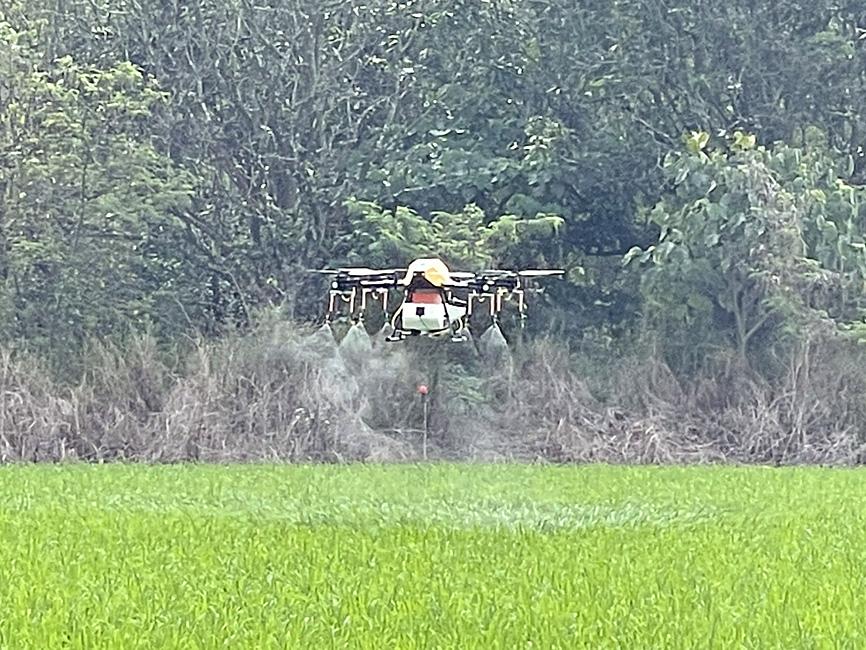Taiwan’s production of “carbon rights” at 5 million tonnes per year would yield an annual NT$7.13 billion (US$251.41 million) if monetized via a carbon tax or other mechanisms, and augment Taiwanese farmers’ income, the Council of Agriculture’s Zero Emission Taskforce said.
Carbon rights refers to carbon stored by plants and other biomass. It has potential value because such storage serves to mitigate climate change, and its value could be monetized or “traded” via a carbon tax or other mechanisms.
Six years ago, the council began researching and breeding plant cultivars that would be more resilient to severe climate patterns, Council of Agriculture Minister Chen Chi-chung (陳吉仲) said in an interview on Wednesday with the Liberty Times (the Taipei Times’ sister newspaper).

Photo: Chen Wen-chan, Taipei Times
However, such measures only support more effective climate-change solutions, and climate problems could only be resolved through a reduction of carbon emissions to zero, Chen said.
Such measures are being implemented internationally, he added.
In an effort to reduce carbon dioxide emissions, the International Energy Agency has said that fossil fuel sources should not be used past 2028, Chen said.
The EU is scheduled to begin implementing what is called a novel carbon border adjustment mechanism starting next year, and to require EU importers to purchase certificates equivalent to weekly EU carbon prices starting in 2026.
Taiwan should also pursue similar goals and frameworks by using Taiwan’s agricultural resources as carbon sinks, Chen said.
The creation of carbon sinks would allow the council to help farmers obtaining “carbon rights,” he said.
This would occur within the Environmental Protection Administration’s carbon rights exchange program, which follows the UN Clean Development Mechanism and Voluntary Carbon Standard, he added.
The council is pushing for measures to help farmers obtain the equipment necessary to implement “circular agriculture” and cut down on carbon emissions, he said.
“Agriculture in the past played a supporting role in the development of industry, but today it must work with the industrial sector to be more competitive on the international market,” Chen said.
The council plans to establish 10 model facilities to promote circular agriculture, which minimizes environmental harms, he said.
Recycling animal waste to generate biogas would make farms and farming villages self-sufficient in power generation, he said, adding that excess power could be sold to the electricity grid.

Chinese Nationalist Party (KMT) Chairman Eric Chu (朱立倫), spokeswoman Yang Chih-yu (楊智伃) and Legislator Hsieh Lung-chieh (謝龍介) would be summoned by police for questioning for leading an illegal assembly on Thursday evening last week, Minister of the Interior Liu Shyh-fang (劉世芳) said today. The three KMT officials led an assembly outside the Taipei City Prosecutors’ Office, a restricted area where public assembly is not allowed, protesting the questioning of several KMT staff and searches of KMT headquarters and offices in a recall petition forgery case. Chu, Yang and Hsieh are all suspected of contravening the Assembly and Parade Act (集會遊行法) by holding

PRAISE: Japanese visitor Takashi Kubota said the Taiwanese temple architecture images showcased in the AI Art Gallery were the most impressive displays he saw Taiwan does not have an official pavilion at the World Expo in Osaka, Japan, because of its diplomatic predicament, but the government-backed Tech World pavilion is drawing interest with its unique recreations of works by Taiwanese artists. The pavilion features an artificial intelligence (AI)-based art gallery showcasing works of famous Taiwanese artists from the Japanese colonial period using innovative technologies. Among its main simulated displays are Eastern gouache paintings by Chen Chin (陳進), Lin Yu-shan (林玉山) and Kuo Hsueh-hu (郭雪湖), who were the three young Taiwanese painters selected for the East Asian Painting exhibition in 1927. Gouache is a water-based

Taiwan would welcome the return of Honduras as a diplomatic ally if its next president decides to make such a move, Minister of Foreign Affairs Lin Chia-lung (林佳龍) said yesterday. “Of course, we would welcome Honduras if they want to restore diplomatic ties with Taiwan after their elections,” Lin said at a meeting of the legislature’s Foreign Affairs and National Defense Committee, when asked to comment on statements made by two of the three Honduran presidential candidates during the presidential campaign in the Central American country. Taiwan is paying close attention to the region as a whole in the wake of a

OFF-TARGET: More than 30,000 participants were expected to take part in the Games next month, but only 6,550 foreign and 19,400 Taiwanese athletes have registered Taipei city councilors yesterday blasted the organizers of next month’s World Masters Games over sudden timetable and venue changes, which they said have caused thousands of participants to back out of the international sporting event, among other organizational issues. They also cited visa delays and political interference by China as reasons many foreign athletes are requesting refunds for the event, to be held from May 17 to 30. Jointly organized by the Taipei and New Taipei City governments, the games have been rocked by numerous controversies since preparations began in 2020. Taipei City Councilor Lin Yen-feng (林延鳳) said yesterday that new measures by